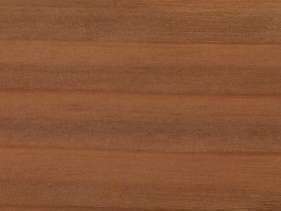 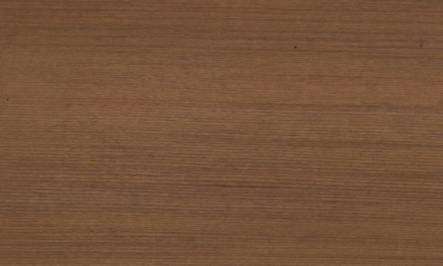 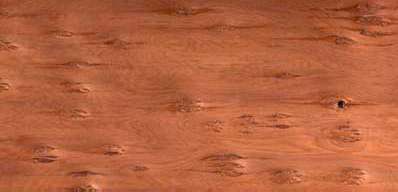 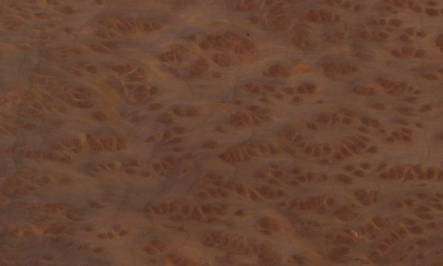 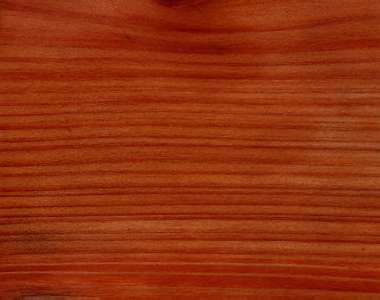 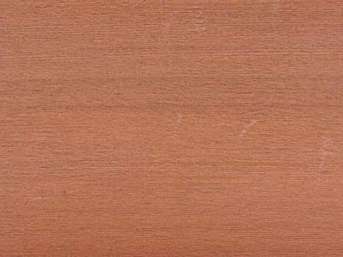
Redwood (Sequoia sempervirens)
Family: Taxodiaceae
Common names: California redwood, Californian redwood, Coast redwood, Redwood, Sequoia, Sequoia pine, Vervona
Distributed in: United States (North America)
Distribution overview: The growth range of the species extends from extreme southwestern Oregon south to central California in the fog belt, a coastal strip of land which is about 5 to 25 (8 to 56 k) miles wide. Redwood forms pure stands in lush dense forests, and may be found in association with Douglas-fir, Port-Orford cedar, and mixed conifers. It prefers mostly alluvial soils on flats and benches or terraces.
Common uses: Agricultural implements, Beams, Bedroom suites, Beehives, Boat building (general), Boat building, Boxes and crates, Bridge construction, Building construction, Building materials, Cabin construction, Cabinetmaking, Canoes, Chairs, Chemical containers, Chests, Cigar boxes, Coffins, Concealed parts (Furniture), Concrete formwork, Construction, Decks, Decorative veneer, Desks, Dining-room furniture, Dowell pins, Dowells, Drawer sides, Excelsior, Exterior trim & siding, Exterior uses, Factory construction, Figured veneer, Fine furniture, Floor lamps, Flooring, Food containers, Form work, Foundation posts, Framing, Furniture , Furniture components, Furniture, Heavy construction, Joinery (external): ground contact, Joinery, Light construction, Millwork, Moldings, Musical instruments: piano, Paneling, Pencil, Plywood, Poles, Posts, Shingles, Signs, Stairworks, Tobacco boxes, Vats, Veneer: decorative
Product sources: Redwood is readily available in the lumber form, and is typically priced competitively with other construction timbers. Redwood burls are available in limited quantities on the west coast of the United States, and are usually priced in the expensive range.
Environment profile: Rare and local throughout is range (21 to 100 occurrences)
Tree size: Trunk diameter is 100-150 cm
Colors: the heart isReddish brown, Yellowand the sapwoodWell defined, White to yellow.The grain isWide variety of grain patterns , the textureMedium to coarseand the lusterLow
Natural durability: Very durable, Very resistant to attack by decay-causing fungi and other wood destroying insects
Odor: No distinct odor or taste
LightInduced Color Change: Lighter
Kiln Schedules: T5-D4(8/4)Us Schedule K (4/4) United Kingdom Heavy T4-F5(4/4)
Drying Defects: Minimal shrinkage and checking may occur , Moderate collapse and honeycombing
Ease of Drying: Very high in moisture content
Tree Identification: Bole/stem form is buttressed
Comments: Abnormal Growth Features Although virgin forests of Redwood still exist in several state parks, as well as in the Redwoods National Parks and along the Redwoods Highway, there are still some concerns about the status of the species outside these areas. While some people advocate that the future of Redwood can be assured through planting in tree farms and regeneration of seed trees after selective logging, others feel that the species should be conserved and maintained at its present levels.General finishing qualities are rated as good Some stock may have alternating even-width zones of compression and normal wood
Blunting Effect: Blunting effect on sawing green wood is mild
Boring: Fairly easy to very easy
Carving: Fairly Easy to Very Easy
Cutting Resistance: Easy to saw
Gluing: Moderate gluing properties
Mortising: Interlocked slightly to moderately
Moulding: Material responds well to moulding operations
Movement in Service: Material responds well to moulding operations
Nailing: Nails hold poorly, Possible if prebored
Planing: Planes well, to a good finish
Resistance to Impregnation: Sapwood is permeable
Response to hand tools: Responds Readily
Routing recessing: Routing yields good results
Sanding: Fairly Easy to Very Easy
Veneering qualities: Diifficult to veneer, There is slight to moderate drying degrade and the potential for buckles and splits
Steam bending: Moderate
Screwing: Poorly holds screws , Possible if prebored; Turning: Good turning qualities
Painting: Good; Polishing: Fairly Easy to Very Easy; Staining: Very Good to Excellent;
- Numerical data Metric
- Numerical data English
- Strength properties
- References
 |
 |
 |
 |
| Item |
Green |
Dry |
Metric |
| Specific Gravity |
0,37 |
0,38 |
|
| Density |
|
400 |
kg/m3 |
| Bending Strength |
481 |
691 |
kg/cm2 |
| Crushing Strength |
28 |
48 |
kg/cm2 |
| Hardness |
|
182 |
kg |
| Impact Strength |
53 |
43 |
cm |
| Shearing Strength |
|
68 |
kg/cm2 |
| Stiffness |
77 |
90 |
1000 kg/cm2 |
| Tangential Shrinkage |
4 |
|
% |
| Radial Shrinkage |
2 |
|
% |
| Weight |
416 |
336 |
kg/m3 |
| Maximum Load |
0,42 |
0,49 |
cm-kg/cm3 |
| Toughness |
|
109 |
cm-kg |
| Static Bending |
|
|
kg/cm2 |
|
 |  |  |  | | Item | Green | Dry | English | | Bending Strength | 6845 | 9836 | psi | | Crushing Strength | 412 | 686 | psi | | Density | | 25 | lbs/ft3 | | Hardness | | 402 | lbs | | Impact Strength | 21 | 17 | inches | | Maximum Crushing Strength | 3984 | 6180 | psi | | Shearing Strength | | 977 | psi | | Stiffness | 1109 | 1281 | 1000 psi | | Toughness | | 95 | inch-lbs | | Work to Maximum Load | 6 | 7 | inch-lbs/in3 | | Specific Gravity | 0.37 | 0.38 | | | Weight | 26 | 21 | lbs/ft3 | | Radial Shrinkage | 2 | | % | | Tangential Shrinkage | 4 | | % | | Volumetric Shrinkage | 7 | | % | |
Density (dry weight) = 23-30 lbs/cu. ft. 0
Max. crushing strength = medium
Hardness (side grain) = very soft
Bending strength (MOR) = low
Work to Maximum Load = very low
Shearing strength (parallel to grain) = very low
Shrinkage, Tangential = very small
Shrinkage, Radial = very small
Toughness-Hammer drop (Impact Strength) = very low
Weight=Medium
Surfaces may dent easily
Soft
Shearing strength (parallel to grain) = low
Modulus of Elasticity (stiffness) = very low
Max. crushing strength = low
Density (dry weight) = 31-37 lbs/cu. ft.
Density (dry weight) = 15-22 lbs/cu. ft.
Compression strength (parallel to grain) = medium
Bending strength (MOR) = very low
Bending stength in air-dried condition...is medium
Bolza, E.,1976,Timber and Health,Div. Building Res. C.S.I.R.O. AustraliaBoone, R.S., C.J. Kozlik, P.J. Bois and E.M. Wengert. 1988. Dry Kiln Schedules for Commercial Woods: Temperate and Tropical. United States Department of Agriculture, Forest Service, Forest Products Laboratory, General Technical Report FPL-GTR-57, Madison, Wisconsin.Brown, H.P. and Panshin, A.J.,1940,Commercial Timbers of the United States Their structure, identification,,properties and uses,McGraw-Hill, LondonBrown, W.H.,1978,Timbers of the World: - No.7 North America,TRADAClifford, N.,1957,Timber Identification for the Builder and Architect,Leonard Hill (Books) LTD. LondonDallimore, W. and Jackson, A. Bruce,1966,A Handbook of Coniferae and Ginkgoaceae Fourth Ed. Revised by S.G.,Harrison,Edward Arnold (Publishers) Ltd. LondonForest Products Research Laboratory U.K.,1957,A Handbook of Softwoods,Department of Scientific and Industrial Research Forest Products Research,HMSOGay, F.J., Et al,1955,Standard laboratory colonies of termites for evaluating the resistance of,timber, timber preservatives and other materials to termite attack.,C.S.I.R.O., Australia Bulletin,No.277Howard, A.L.,1948,A Manual of Timbers of the World.,Macmillan & Co. Ltd. London 3rd ed.I.U.F.R.O.,1973,Veneer Species of the World,Assembled at F.P.L. Madison on behalf of I.U.F.R.O. Working Party on,Slicing and Veneer CuttingJackson, A. and D. Day.1991.Good Wood Handbook - The Woodworker's Guide to Identifying, Selecting and Using the Right Wood.Betterway Publications, Cincinnati, Ohio.Kaiser, J.Wood of the Month:Redwood - Redwoods Stand Tall, Unique Among U. S. Trees.Wood & Wood Products, December, 1986.Page 38.Kline, M. 1979. Sequoia sempervirens - Redwood. In A Guide to Useful Woods of the World. Flynn Jr., J.H., Editor. King Philip Publishing Co., Portland, Maine. 1994. Page 327-328.Kloot, N.H., Bolza, E.,1961,Properties of Timbers Imported into Australia,C.S.I.R.O. Forest Products Division Technological Paper,No.12Lindquist, J.L.,1974,American Woods - Redwood,USDA, Forest Service American woods FS262Little, E.L.1980.The Audobon Society Field Guide to North American Trees - Western Region.Published by Arthur A. Knopf, New York.Markwardt, L.J., Wilson, T.R.C.,1935,Strength and related properties of woods grown in the United States,U.S.A. Department of Agriculture Technical Bulletin,No.479Panshin, A.J. and C. deZeeuw. 1980. Textbook of Wood Technology, 4th Edition. McGraw-Hill Series in Forest Resources. McGraw-Hill Book Company, New York.Patterson, D.,1988,Commercial Timbers of the World, 5th Edition,Gower Technical PressRecord, S.J., Hess, R.W.,1943,Timbers of the New World,Yale University PressRedding, L.W.,1971,Resistance of Timbers to Impregnation with Creosote,Forest Products Research Laboratory, Princes Risborough, Building Research,Establishment Bulletin No.54 pp.43Rendle, B.J.,1969,World Timbers (3 Vols.,Ernest Benn Ltd. LondonRijsdijk, L.F. and Laming, P.B.,1994,Physical and Related Properties of 145 Timbers, Information for,Practice,TNO Building and Construction Research Centre for Timber Research Kluwer,Academic PublishersSkolmen, R.G.,1963,Robusta Eucalyptus Wood: Its Properties and Uses,US. Forest Service Research Paper, No. PSW-9, Pacific Southwest Forest,Range Experimental StationSmith, D.N.,1959,The Natural Durability of Timber,Forest Products Research Laboratory, Princes Risborough, Building Research,Establishment Record,No.30Stone, H.,1924,The Timbers of Commerce and their Identification,William Rider & Sons Ltd. LondonT.R.A.D.A.,1942,Home-grown timber trees - their characteristics, cultivation and Uses,TRADAThe Australian Timber Journal & Building Products, Merchandiser,1969,Timber Durability and Preservation,Supplement to Australian Timber Journal 35(4) Tech. Timb. Guide No.8Timber Development Association Ltd.,1955,World Timbers (3 Vols.,Timber Development Association Ltd.Titmuss, F.H.,1965,Commercial Timbers of the World,Technical Press Ltd., London, 3rd editionU.S.D.A. Forest Service,1974,Wood Handbook,U.S.A. Department of Agriculture, Forest Service Handbook,72USDA. 1987. Wood Handbook - Wood as an Engineering Material, Forest Service, Agriculture Handbook No. 72, Forest Products Laboratory, Madison, Wisconsin.USDA. 1988. Dry Kiln Operators Manual, Preliminary Copy. Forest Service, Forest Products Laboratory, Madison, Wisconsin.WCMC. 1992. Conservation Status Listing: Trees and Timbers of the World. World Conservation Monitoring Center (WCMC, Plants Program, 219 Huntingdon Road, Cambridge, CB3 ODL, United Kingdom.Western Wood Products Association.19__.Woods of the Western USA.Published and Distributed by the Western Wood Products Association, Yeon Building, 522 S.W. Fifth Avenue, Portland, Oregon.Wolcott, G.N.,1950,An Index to the Termite Resistance of Woods,Agricultural Experimental Station, University of Puerto Rico Bulletin,No.85
|













